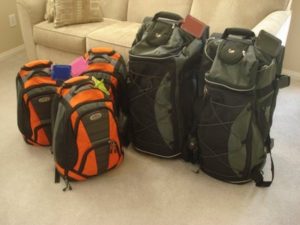Emergency situations such as fire, extreme weather and power outages can happen without warning. By taking the time to prepare for a possible disaster, you and your family will be equipped to handle a crisis if one ever occurs.
Fire Safety, Escape Routes and Meeting Spots
• We suggest having a fire extinguisher on each floor, and check them annually to make sure they’re functioning properly.
• Smoke and carbon monoxide detectors should be installed in each room and tested once a month. Use long-life lithium batteries to cut back on replacements.
• It is important to have an escape plan for yourself and your family, it could only take a mere five minutes for a fire to engulf your entire home. Ensure to include at least two exit routes in case one is blocked, and designate a safe location for your household to meet.
Emergencies are easier to handle when you have prepared ahead of time. Have a go bag ready if you must shelter in or evacuate your home. Make sure that your go bag is easy to carry and easy to get to.
What to Include in Your Go Bag, Home Safety Items and Tips
• Battery powered radio and extra batteries
• Flashlight with Extra Batteries
• Lightweight blankets
• Emergency information, including insurance policies, blood type, and emergency contacts
• A list of medications and correct dosage, and doctor’s names
• Personal items such as toothbrushes, soap, extra glasses, etc.
• First-Aid kit- (This would also be a good idea to store in a central location in your home, such as the kitchen, and make sure everyone knows where it is)
• Whistle
• Change of clothing
• Nonperishable snacks (At least a three-day supply for each member in the household)
• Water (At least a three-day supply for each member in the household. During an emergency, you should drink at least two quarts of water a day. Drink 3-4 quarts a day if you are in a hot climate, pregnant, sick, or a child. If you buy commercially bottles water, it should be replaced once a year. Store your water in a cool, dark place to keep it tasting fresher longer.)
• Books, cards or magazines to pass the time
There’s often very little time to react to a crisis. Meet with your family or household members to discuss how to prepare and respond to emergencies. Identify responsibilities for each member of your household and plan to work together as a team. The unknown often causes more anxiety than knowing the facts. With a little planning and prep work, you can be well-equipped and ready to respond to emergencies accordingly.
